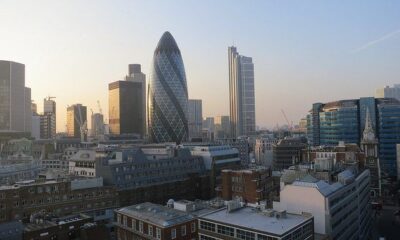

Economy
Christian Aid Asks For Climate Cobra Group
A Climate COBRA Commitee should be called for to manage the risks posed by global warming revealed in a new report from the Government’s official advisors on climate change, Christian Aid has stated.
Tuesday’s report from the Climate Change Committee (CCC) shows that the UK faces major risks across the board, including flooding due to sea level rise, increasing temperatures threatening water shortages, the spread of new diseases and disruption to international food production and trade. This comes after a recent Christian Aid report Act Now or Pay Later, reported that the UK ranked 18th among countries with the most exposed populations in low lying coastal areas by 2030.
Tom Viita, Christian Aid’s Senior Political Advisor, said the UK could not pull up the drawbridge on climate change.
“The UK is not insulated from global shocks,” he said. “The impact of climate change, both here and overseas, is coming back to bite us. The Climate Change Committee’s analysis shows red and yellow lights flashing all over the dashboard. The current set up of government departments has proved inept at managing cross-cutting risks and international dimensions. Instead, the new Prime Minister must chair a Climate Cobra Committee to handle these risks more effectively and with the urgency required.
“Climate change is a major threat to national security, but there is no conventional security response to climate change. Barbed wire won’t work. The only solution is global cooperation to cut emissions, a rapid U-turn away from business-as-usual investment in fossil fuels and a massive acceleration in clean energy and climate adapted infrastructure. Climate change is happening and the risks are all too real: the choice we face is an orderly and fair transition to a low carbon economy, or massive economic and environmental shocks that will force the change.”
Mr Viita added that the UK’s position gave it an important role to play in tackling the problem. He said: “The report shows serious risks to the British economy and society, but the outlook is far worse for developing countries who are already experiencing climate-related shocks to their communities, food systems, and even political stability.
The UK is privileged to have the resources, policies and science base to adapt to these risks and play a major role in helping other countries to face these risks too.
“Our international aid and climate finance commitments can be a major boost to resilience in areas most under threat, and thereby support a reliable food and trade system upon which the UK relies.”
London’s future vulnerability to climate change was also highlighted in the Christian Aid report Act Now or Pay Later. Impacts include tidal flooding, water shortages and health risks caused by hotter summers and growing population pressure and the impact on London’s globally connected financial sector as climate change affects investments and businesses around the world. London has been a member of the C40 Cities Climate Leadership Group adapting to these urban challenges.
Mr Viita added: “Responding to climate change must be a cornerstone of Sadiq Khan’s mayoralty. Today’s report shows that London’s prosperity and those of our communities are dangerously exposed – but the good news is, London can plan ahead to become the world’s most resilient city.”


 Environment12 months ago
Environment12 months agoAre Polymer Banknotes: an Eco-Friendly Trend or a Groundswell?

 Features11 months ago
Features11 months agoEco-Friendly Cryptocurrencies: Sustainable Investment Choices

 Features12 months ago
Features12 months agoEco-Friendly Crypto Traders Must Find the Right Exchange

 Energy11 months ago
Energy11 months agoThe Growing Role of Solar Panels in Ireland’s Energy Future





























